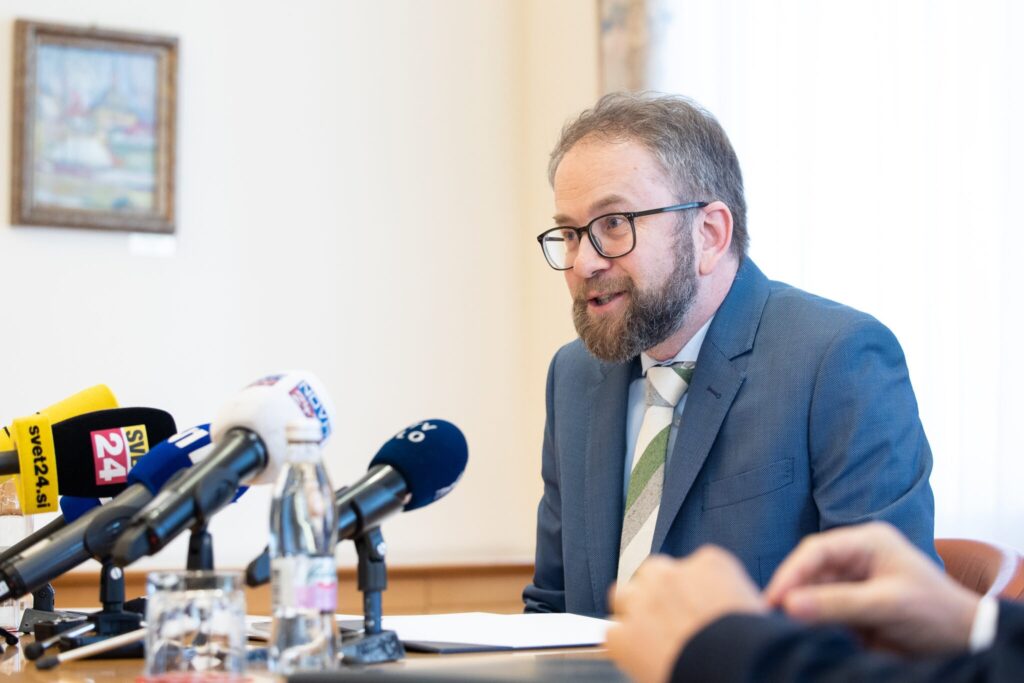Not long ago, we reported that Constitutional Court Judges Matej Accetto and Rajko Knez were offered prestigious and well-paid European judgeships in return for their service to the Golob government. Judging by the recent words of Judge Matej Accetto, it is increasingly looking like this might, in fact, be true. If the allegations are formally confirmed, this will be the biggest corruption scandal in the history of the Constitutional Court.
“Do I think he would be a good candidate for the European Court? Surely he would be, wouldn’t he? And what would happen if someone happened to think about wanting to nominate him? Would the person who spread this information actually then say, well, you see, here is the proof, or what? Obviously, this has happened, because we wrote about it then, and it is obviously happening now,” said Constitutional Court Judge Matej Acetto at the annual presentation of the Constitutional Court’s report.
Namely, Constitutional Court Judges Accetto and Rajko Knez voted for the Constitutional Court to suspend part of the Radio-Television Slovenia Act that regulated the appointment of the new Programme Council of our national media outlet, and then in the meantime, we reported that the judges who were still “on the fence” about it were being offered well-paid jobs at the European Court of Human Rights (ECHR) by the government side if they would cooperate in overturning the decision. And that is exactly what happened. Accetto and Knez were mentioned in this context, and this was confirmed in the decision of the 26th of May, when the interim suspension was lifted, thus denying the petitioners legal redress.
And in the meantime, controversial events took place, for example, when Accetto was a guest on Radio Slovenia’s programme “At Eight o’clock on the First Channel of Radio Slovenia” (Ob osmih na prvem programu Radia Slovenije) the day before the decision was made. Before that, he was also visited by European Commissioner Věra Joruová. It should also be recalled that even before the decision was taken, Prime Minister Robert Golob was already “dancing” and celebrating, and apparently already knew the outcome of the ruling. This is a scandal – especially for a state supposedly governed by the rule of law and democracy.
When presenting the Constitutional Court’s annual report, Accetto said that he considered Judge Rajko Knez to be a suitable candidate for the ECHR, and in the continuation of his statement, it seemed as if he was trying to justify, in a legitimate way, his possible candidacy, should it actually happen. It was speculated that the prestigious European offices would be a reward for the judges’ obedience and servility to Golob, and the fact that Accetto did not strongly deny this, practically confirms the above-mentioned insinuations.
Accetto is annoyed by people constantly scrutinising the Court’s work
Accetto criticised, among other things, the media, which he described as being too inquisitive after each session, and although he explained that he was not bothered by the public’s interest in the decision on the Radio-Television Slovenia Act, he was bothered by the “constant scrutinising of the work of the Constitutional Court.” “The problem is when such criticism turns into more personal or systemic criticism of the court, which can be either damaging to the institution as a whole or insulting to individual judges, and more likely than not constitutes discrediting,” Acceto said. Does it really?
Former President of the Programme Council of Radio-Television Slovenia, Peter Gregorčič responded to Accetto’s recent statement and mainly took issue with the fact that the President of the Constitutional Court spent most of his press conference commenting on the case he was deciding on, instead of the Court’s annual report. “The authorities have acted in unison against the complainants. Since the Constitutional Court has now protected the political interests of the authorities against individuals, it is in no hurry to continue with its work,” he commented on Accetto’s words that the Radio-Television Slovenia Act will not grow old even after two years. “Accetto argues that a judge should not say, ‘the case is too difficult; decide without me’. And yet he himself voted in favour of a decision in which the Constitutional Court said exactly that: ‘The Constitutional Court cannot fulfil its constitutional role, in accordance with the principle of effective judicial protection,'” Gregorčič wrote, referring, of course, to the decision to lift the suspension of the Radio-Television Slovenia Act.
Ana Horvat


